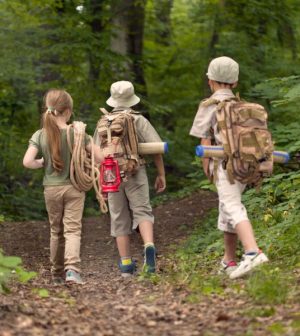- Could Your Grocery Store Meat Be Causing Recurring UTIs?
- Are You Making This Expensive Thermostat Error This Winter?
- Recognizing the Signs of Hypothyroidism
- 10 Strategies to Overcome Insomnia
- Could Artificial Sweeteners Be Aging the Brain Faster?
- Techniques for Soothing Your Nervous System
- Does the Water in Your House Smell Funny? Here’s Why
- Can a Daily Dose of Apple Cider Vinegar Actually Aid Weight Loss?
- 6 Health Beverages That Can Actually Spike Your Blood Sugar
- Treatment Options for Social Anxiety Disorder
Summer Camp Prep for Kids With Allergies, Asthma

Heading to summer camp for the first time is always a little unnerving. But for a child with allergies or asthma, there are special concerns.
For these children, a few precautions can make summer camp a safe and fun experience, said Dr. Stephen Tilles, president of the American College of Allergy, Asthma and Immunology.
“Summer camp is often a child’s first big activity away from home — whether it’s a day or overnight camp,” Tilles said in a college news release.
“And every kid should have the opportunity to spread their wings and try something new without worrying about their health,” he added.
Tilles offered the following tips:
- Talk with camp staff to find out how physically active children will be, how meals are handled, and how the camp will respond if your child has a medical emergency.
- Outline your expectations, such as how you want your child’s medical routine handled.
- Meet with the person responsible for medical care and your child’s counselor before the first day of camp to make them aware of your child’s medical needs. Your child should attend the meeting too, so he or she is prepared to track symptoms and triggers.
- Take your child to an allergist before summer camp. If your child uses medications or an epinephrine auto injector for severe allergic reactions, make sure there’s an adequate supply of medications. Don’t forget to check expiration dates.
Most day camps take steps to keep children with allergies and asthma safe, and welcome discussions about what your child can and cannot eat, and what they need to have on hand in case of a severe allergic reaction or asthma attack, Tilles said.
“Make sure the camp you choose has dealt with allergies and asthma before, knows where the nearest hospital is and how to get there, and when to call 911,” he advised.
More information
The U.S. Centers for Disease Control and Prevention offers camp health and safety tips.
Source: HealthDay
Copyright © 2026 HealthDay. All rights reserved.










